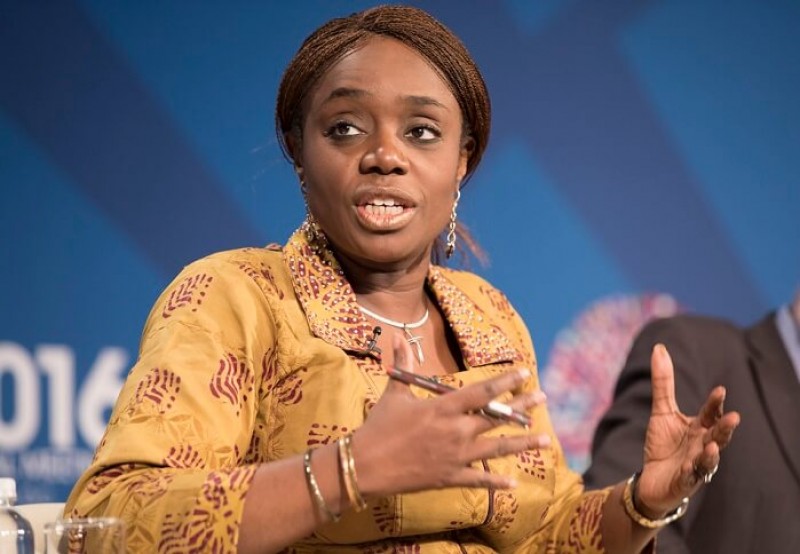Gas flaring: Why Nigeria can’t collect ‘fine’ from IOCs -Adeosun

The traditional ruler of Etitioha Ipu Autonomous Community in Owaza in Ukwa West Local Government Area of Abia State, His Royal Majesty, Eze Obioma Levi Nwaorgu, recently lost his elder brother, Henson Nwaorgu to the cold hand of death. He allegedly died after inhaling gas emitted from a Shell oil rig in the area.
According to Eze Nwaorgu, despite Nigeria’s anti-gas flare law, Shell has mindlessly continued to flare gas from all its oil rigs in the town unperturbed, he has therefore called on the Federal Government to urgently intervene to forestall impending health hazards in the area.
Shell is not alone in this, all the international oil companies in the country have continued to flare because it is cheaper for them since they have managed avoid the payment of a supposed $3.50 fine for every 1,000 standard cubic feet (SCF) of gas flared.
Sunday Telegraph learnt that this was made possible for the IOCs by one misplaced word in the law that was set up as a deterrent to gas flaring in the country.
To prevent companies from flaring, Nigeria has sought to enforce a fine of $3.50 for every 1,000 standard cubic feet (SCF) of gas flared. Rather than expensively process gas for domestic and other uses, major oil companies resort to the cheaper option of flaring gas as a waste product.
“Just that one word has potentially cost us billions of dollars,” Finance Minister, Kemi Adeosun said.
In trying to make it a more expensive option, the law sought to fine companies for flaring but the money to be paid was worded as a “charge” rather than a “penalty,” IOCs continue to flare while paying the charges which are tax deductible rather than hefty fines as intended.
In the “legal framework for the gas-flaring penalty, it was drafted as a charge. A charge is tax deductible,” Adeosun said in a recent interview with Bloomberg.
“So, what do the international oil companies do? They flare, they pay the charge on which they get tax relief. That’s just bad drafting.”
The government is approaching lawmakers to amend the law and have the word “penalty” replace “charge,” the minister said in her office in the capital, Abuja.
Oil companies flare natural gas that is produced along with crude instead of harnessing it because that can be costly or difficult for security reasons. Nigeria has sought to limit the practice over the years as it pollutes the environment and contributes to global warming.
According to experts, Nigeria lost $76.59 million in September 2017 alone as oil and gas companies operating in the country flared 25.53 billion standard cubic feet (SCF) of gas.
According to data released by the Nigerian National Petroleum Corporation (NNPC), in its Monthly Financial and Operations Report for that month, the amount lost to gas flaring in August was 10.44 per cent lower than the $85.53 million, about N26.51 billion lost to gas flare in August, as oil firms flare 28.51 billion SCF of gas.
In addition, the report noted that the country lost $615.69 million, about N190.86 billion to gas flaring between January and September 2017, as the oil and gas companies flared 205.23 billion SCF of gas in the nine-month period.
Giving a breakdown of the quantity of gas flared in the nine-month period, the report stated that in the January, February, March, April and May and 2017, oil firms flare 24.77 billion SCF, 20.42 billion SCF, 21.47 billion SCF, 20.5 billion SCF and 21.75 billion SCF of gas respectively.
On the other hand, 19.90 billion SCF, 22.38 billion SCF, 28.51 billion SCF and 25.53 billion SCF of gas was flared in June, July, August and September respectively.
The report further noted that a total of 221.26 billion SCF of gas was supplied in September 2017, out of which 18.74 billion SCF and 12.04 billion SCF was supplied domestically to power firms and industries respectively, while 94.81 billion SCF was exported.
In the export segment, 1.89 billion and 4.65 billion SCF of gas was exported through the West African Gas Pipeline and Escravos Gas to Liquid project respectively, while 2.65 billion SCF and 85.63 billion SCF was exported through Natural Gas Liquids/Liquefied Petroleum Gas and the Nigerian Liquefied Natural Gas Limited, NLNG, respectively.
For oil rich Niger Delta region, being blessed with the resource has come at a great cost. Farmlands have severely damaged and water-bodies have been polluted, affecting the livelihoods of residents.
But it’s not a problem that’s going away soon. In 2015, Shell Petroleum Development Company agreed to a clean-up of major oil spills in Bodo community in the Niger Delta region and, showing the scale of the problem, the clean up is expected to cost around $500 million and will take up to 10 years to complete. In a rare victory for such communities, Shell also agreed to pay £55 million ($84 million) in settlements to Bodo community for the devastating effects of the spill.
Meanwhile, the Minister of State for Petroleum Resources, Dr. Ibe Kachikwu, has renewed the Federal Government’s commitment to end gas flaring by 2020.
The Minister, who gave this assurance in the monthly bulletin of Organisation of the Petroleum Exporting Countries (OPEC), said Nigeria’s desire is to end gas flaring 10 years ahead of the 2030 United Nations deadline on flare out.
According to him, Nigeria is about 70 per cent compliant on gas flare exit, and hopes to take away the other 30 per cent within the 2020 deadline.
Speaking on the gas policy, he said: “We are going to try and change our dynamics from being an oil producing country to being a gas producing country, because that is really what we are. Now we need to move from policies to directives.”









0 Comments